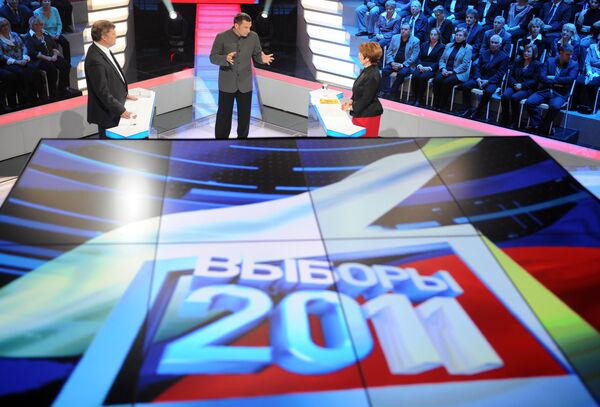This year’s legislative elections will involve a total of 3,053 candidates from seven registered parties battling for seats in the sixth State Duma. Here is a snapshot of the party landscape ahead of the December 4 vote.
- With President Dmitry Medvedev being number one on its ticket and Prime Minister Vladimir Putin being its formal leader, the United Russia party dominates the current Duma and is fielding 597 candidates this year, more than any other party. It is the ruling party and many candidates heading regional party lists this year already hold posts in the federal government. Among those currently serving in the central government are first deputy prime ministers Viktor Zubkov and Igor Shuvalov, as well as deputy prime minister Igor Sechin and head of the Presidential Administration Sergei Naryshkin. United Russia has also enlisted quite a few celebrities to bolster its candidate list. Cultural figures such as Hermitage Museum Director Mikhail Piotrovsky and “Russia’s Frank Sinatra”, crooner Iosif Kobzon, will join sports stars such as Putin’s favorite gymnast-turned-TV-anchor Alina Kabayeva and boxing champion Nikolai Valuev.
- Russia’s second most-popular party the Communist Party (KPRF) is once again led by Gennady Zyuganov, who has consistently led the KPRF to second place in every election since the collapse of the Soviet Union. In addition to the KPRF stalwarts that espouse left-wing values and rely heavily on nostalgia for the Soviet Union, this year the party managed to poach a few disaffected former United Russia members to join its ranks. Former intelligence officer Viktor Cherkesov, a one-time close associate of Prime Minister Vladimir Putin, before he was sacked from his position as head of the State Anti-Drugs Service in 2008 is running on a Communist ticket. As is Alexei Lebed, former governor of a Siberian republic of Khakassia, who faced criminal charges for abuse of office in 2006.
- The Liberal Democratic Party (LDPR) relies heavily on the bellicose personality of leader Vladimir Zhirinovsky, stirring up nationalist dissent and pandering to populist causes. Two controversial candidates stand out in the LDPR list this year though: Andrei Lugovoi, one of the prime suspects in the 2007 assassination of Alexander Litvinenko in London; and Valery Budanov, son of former Russian Colonel Yuri Budanov. Lugovoi was already elected to the Duma in 2007 amid a diplomatic scandal with Great Britain. Budanov senior’s conviction for the violent murder of a young woman in Chechnya made him a cause célèbre among Russian nationalists, before he was eventually gunned down in central Moscow in June this year.
- It has been a year of mixed fortunes for a Just Russia, which is nevertheless fielding 584 candidates in this December’s vote. Party leader Sergei Mironov was ousted from his position as head of the Federation Council in May this year, raising questions about the party’s future. The party, declaring socialist values, was widely seen as a Kremlin invention designed to steal votes from the Communists in the previous elections. However, more recently the party emerged as a strong critic of United Russia. The party suffered a minor blow this week when the Supreme Court revoked the candidacy of Marina Smirnova – daughter-in-law of Igor Smirnov, leader of the breakaway republic of Transdnestr, on a technicality.
- Right Cause styles itself as a pro-business party and enjoyed a brief period in the spotlight this year, when billionaire Mikhail Prokhorov took over as party leader. The metals magnate was ousted in September 2011, however, before party lists were finalized. He was replaced by the more anonymous Andrei Dunaev, which some analysts believe cost the party some potentially valuable candidates. Another colorful party leader is Andrei Bogdanov, Russia’s chief freemason.
- Established in 1993, Yabloko was one of the most successful liberal parties to emerge in post-Soviet Russia. Its influence has waned significantly in the last decade however and in 2003 the party lost its representation in the Duma. With a party list made up of candidates pushing for liberal reforms and respect for human rights, it is led by Grigory Yavlinsky. Yabloko’s failure to form a serious opposition to United Russia has left much of its potential support base disillusioned. It has, however, also managed to convince some high-profile former United Russia members to run on its ticket this winter. They include the ambitious former mayor of Arkhangelsk Alexander Donskoy, and Oleg Mitvol, former deputy head of the Federal Service for Environmental Protection.
- The Patriots of Russia party blends nationalism with aspects of communism and is backing 302 candidates this year. The party, which gained some momentum from its involvement in large-scale protests against United Russia in Kaliningrad in 2009, is led by former Communist Party member Gennady Semigin. Candidates steer clear of the more extremist language of Russia’s nationalist movement but rely on patriotic sentiment for support.



